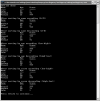Well other than what's already been mentioned, reading as many technical C++ books as you can get hold of might also help.
I'm not going to mention any books here though because there's a sticky at the top of the C++ forum that has loads of book titles posted in it. I think most of the must-have C++ classics are listed there!
Cheers for now,
Jas.

